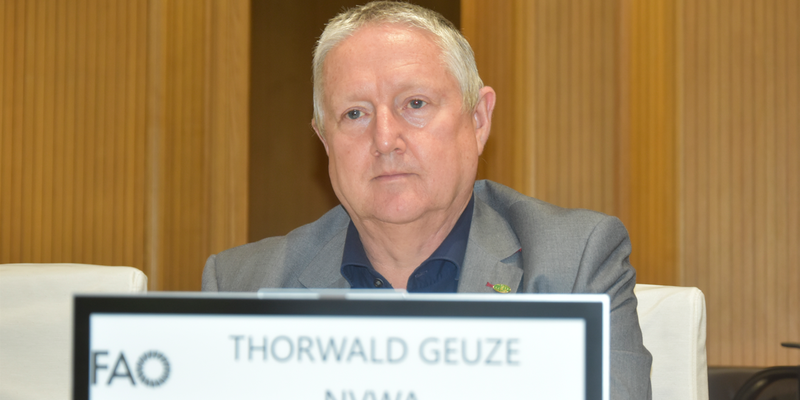Spotlight: Thorwald Geuze, from the Food and Consumer Product Safety Authority of the Netherlands, speaks about the importance of e-commerce and IPPC Observatory surveys
Posted on Thu, 03 Oct 2024, 12:30

FAO ©
As a spotlight feature for this month, we speak to Thorwald Geuze, Senior Plant Health Officer at the Ministry of Economic Affairs - Food and Consumer Product Safety Authority – of the Netherlands, Vice Chair of the Implementation and Capacity Development Committee (IC) lead for the IC team on e-commerce.
Q: Welcome, Thorwald. Could you please introduce yourself and share a bit about your involvement with the Netherlands National Plant Protection Organization (NPPO) and the IPPC?
A: Thank you. I’m currently the Senior Plant Health Officer at the Food and Consumer Product Safety Authority of the Netherlands (NPPO of the Netherlands). My involvement in the Implementation and Capacity Development Committee (IC) began in 2020 when I was also appointed IC lead on e-commerce and in 2023, I was elected Vice Chair of the IC.
Q: You’ve been heavily involved with e-commerce through the IC. Why do you think this has become such a priority for the phytosanitary community now?
A: The pandemic brought a huge surge in online shopping, leading to an increase in the volume of parcels being shipped globally. This included items like plants and seeds, which can pose phytosanitary risks. You might remember the "seed-brushing scam" where people received seeds they hadn’t ordered – these highlighted vulnerabilities in the system and showed us that e-commerce was becoming a significant pathway for potential pest introductions.
Q: What are the risks for NPPOs if they don’t act on e-commerce and these new trade dynamics?
A: E-commerce trade isn’t as supervised as traditional, large-scale commercial trade like shipping containers of plants or plant products. While parcels fall under national plant protection regulations, due to the sheer scale of the packages that move across the world every day and the multiple pathways that they move through, they’re not as closely monitored. The lack of supervision increases the risk of harmful organisms being introduced unintentionally. Additionally, without proper oversight, there’s potential for deliberate misuse, such as smuggling or sending high-risk items that could introduce pests or diseases.
Q: In 2014, the CPM (Commission on Phytosanitary Measures) adopted a recommendation on e-commerce. What are your thoughts on the progress since then, especially regarding the IC’s work?
A: The 2014 recommendation was a strong starting point, but it was just that – a recommendation. What’s made a real difference is the publishing of the IPPC guide on e-commerce, which offers step-by-step advice for NPPOs looking to regulate or supervise e-commerce and work closely with key partners like customs organizations and mail and courier services. The team has developed a specific webpage on the IPPC website on e-commerce with a number of capacity development materials which I encourage those reading this interview to have a look at. The IC team on E-commerce also held a successful side session during the last CPM (CPM-18), where a number of NPPOs presented case studies including Argentina, Canada, New Zealand and the US as well as the Universal Postal Union, one of our key partners on this topic (recording here). The feedback following these activities has been very positive, and I think more NPPOs are starting to see the value of focusing on e-commerce.
Q: The IPPC Observatory is conducting a survey on e-commerce right now. Why do you think now is the right time for this?
A: E-commerce is a growing pathway for potential pest introductions, so this is definitely the right time as the survey will help us gather data to understand NPPOs’ needs and challenges in this priority area. Like with all surveys, we use the IPPC Observatory platform, a crucial platform developed to measure, monitor and report on the implementation of the IPPC, ISPMs, and CPM Recommendations at a global phytosanitary level.
Q: Why is it so important that NPPOs respond to the current IPPC Observatory survey on e-commerce?
A: The IC works in service of NPPOs so it’s vital that they share their insights with us. We hope to gain insights into what’s working, what’s not, and where we can provide more support. It’s not just about measuring the current situation, but also about planning for the future including what additional tools or resources may be truly useful for the phytosanitary community.
The IC and the IPPC Secretariat have made considerable efforts, with this survey, to embed previous NPPO feedback and improve the format of the survey, individual questions and the process overall. I strongly encourage all IPPC Contact points to send back their completed surveys by the 31st of October!
Q: Is there a message you’d like to share with other IPPC contact points or NPPOs who might feel hesitant about responding?
A: Absolutely. First of all, there are no wrong answers. If your NPPO is struggling with certain aspects of e-commerce or hasn’t started addressing it yet, that’s okay. It’s just as important for us to hear where NPPOs are facing difficulties as it is to hear about successes. The survey isn’t a test – it’s a way for us to understand where you are and how we can help.
Q: Finally, any last thoughts or messages for the NPPO community?
A: Yes, aside from the survey, I encourage NPPOs to share interesting case studies with us by emailing the IPPC Secretariat ([email protected]). If any NPPO has found an effective way to address certain challenges related to e-commerce, it would be great to highlight those solutions on our e-commerce page and share successful practices with the wider community!
Further information

